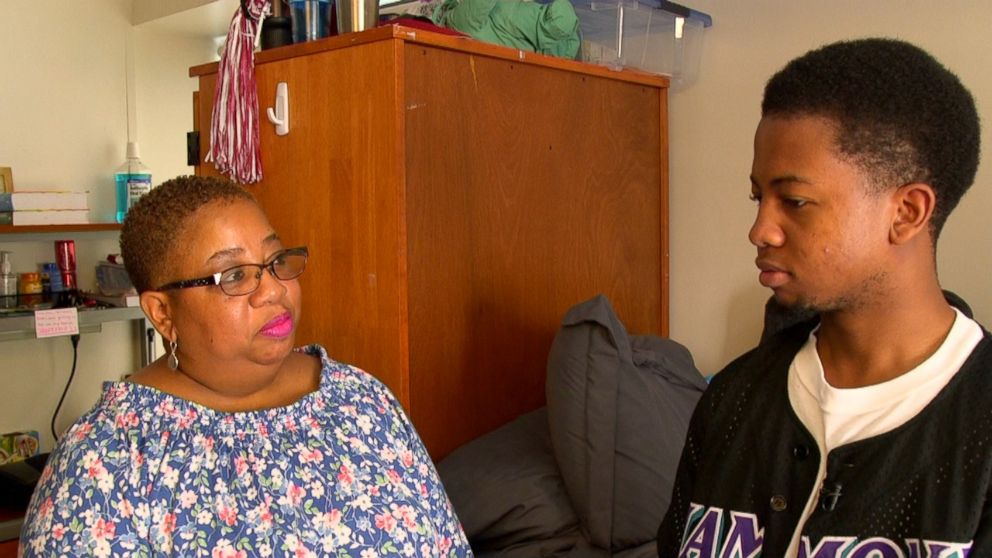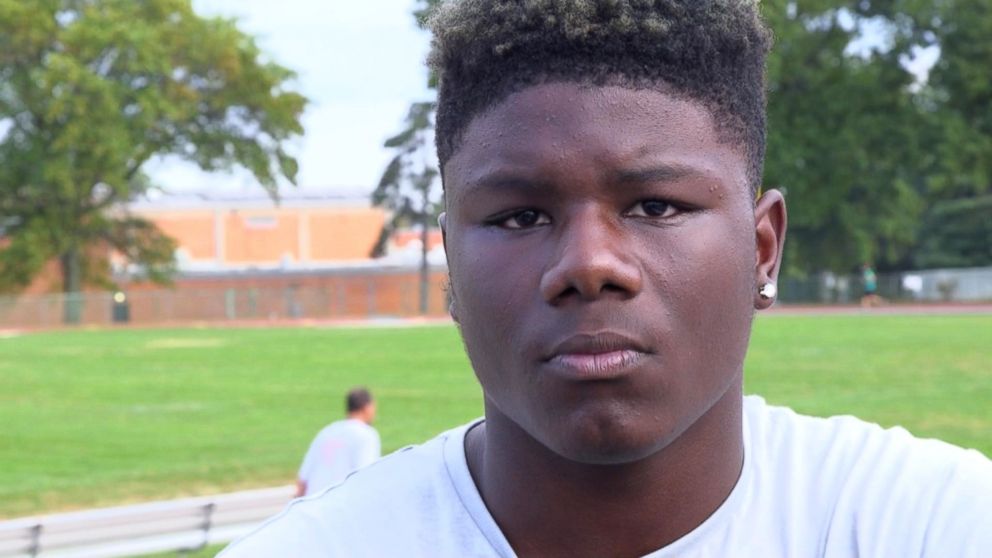Workshops help parents have 'the talk' with kids on what it means to be black in the US
"I fear that I'm possibly going to die before I even turn 18."
— -- Winston Harris remembers watching the video of Philando Castile after he was shot by Officer Jeronimo Yanez of Minnesota’s St. Anthony Police Department back in 2016.
“You know those seven shots … the video hit me so hard and so deep,” Harris, 19, told ABC News’ “Nightline.” “As each shot rang out I could feel it. Not like actually, but, like, I could feel it, like, each time, like, bang, bang, bang, like I could just feel it. Like in my chest like seven beats.”
In Castile’s face, the Philadelphia native said he saw his own.
“A video like that can have [an effect] on the person, you know, especially if he's the same skin color,” Harris said.

Across town, another teenager, Eche Fersner, was having a similar reaction. It led him to pen a grief-stricken post on the modern teenager’s diary: Facebook.
“We can't even go outside without having to be scared for our live [sic] or our children lives because cops (not all) wanna kill black people and not have to go to jail for it,” Fersner, now 16, wrote on Facebook.
“I don't know how many lives have to be taken until something is, like, until something happens so we don't have to feel that way anymore,” Fersner told “Nightline.” “It hurts because my life just seems like it's nothing in the United States.”
Their experiences are not unique. Though the boys both come from comfortable, middle-class neighborhoods, with parents who love them -- like many other black families in this country -- they face a unique fear that they will go out into the world and not return alive.
“Institutionalized racism affects African-Americans in a very profound way,” says Dr. Kenneth Hardy, a clinician and professor at Drexel University. “I think a disproportionate portion of the African-American community actually suffers from trauma.”
Harris’ mother, Pat Harris, a warm woman with a wide smile, said she knows that sentiment all too well. “What do I think of when raising a black child in America? At times it could be frightening,” she said.Pat Harris has made an effort to shield her son, sending him to diverse private schools and raising him in a safe neighborhood.
“He sang in the choir, the Philadelphia Boys Choir & Chorale, for six-and-a-half years. And I decided to move in an area that was, you know, pretty for the most part, you know, safe and quiet, and, you know, had other kids like him and other parents like myself sending their children to private schools,” Pat Harris said.
But her efforts don’t make her son immune to the reality of the world around them.
“Honestly, I’m a little scared. I’m not, like, frightened, like, oh my gosh. But you know, it is unsettling,” Winston Harris said.
Like Winston Harris, Fersner worries for his future.
“I am only 15 years old, and I fear that I’m possibly going to die before I even turn 18,” Fersner told "Nightline" co-anchor Byron Pitts.
Aziza Young, Fersner’s mother, said that as a parent to a black child, she feels she always has to worry about her son’s safety.
“I believe he’s prejudged before people actually get to know him. That’s just how it’s been programmed in society,” she told “Nightline.”
Hardy said this feeling of "unsafety" is not some made up idea.
“I know there’s this view that somehow that this is all manufactured, that we’re making this up, that’s just the kind of paranoia,” Hardy told “Nightline.” “African-Americans have not really engendered broad sweeping empathy because I think that's what racism has done. There’s a tremendous empathy gap.”
This trauma that Hardy said African-Americans can experience seems to partially stem from stories, like Castile’s, of African-Americans being shot and killed by police.
And according to an investigation by The Washington Post, though African-Americans represent only 13 percent of the U.S. population, they account for 23 percent of all individuals killed by police in the U.S.

Fersner’s father, Mike Young, said he struggles with wanting to protect his family, but knowing there’s so much he cannot control.
“You’re powerless. You can’t do anything. You feel like you cannot do anything about it,” Mike Young told “Nightline.”
“It's very heartbreaking to hear him say that your son doesn't think he'll make it to 18, because I hope he does. For him to feel that way, for each day to feel like that his life isn't valued, that's y’all fault America. That's your fault,” Aziza Young said, defiantly. “Because I told my sons and my daughters all the time I love them and that they are kings and queens and that they're beautiful. And it would be nice if that was the only thing that a parent had to say to their children to keep their confidence up and to keep them feeling safe.”
She added, “It pisses me off.”
But that’s not all Fersner’s parents have to teach him, she said. Aziza Young said she warns them to watch their backs and to be mindful.
“You don’t talk back. Sometimes even if you’re wrong, let it go,” Mike Young said.
They said conversations like these are ones only families of color have to have.
“The topic of, ‘Do you teach your kids how to talk to cops, how to speak to police officers?’ and [someone] who was white said, ‘No, why would I have to talk to my kids about it?’” Aziza Young said. “And I was like, ‘Exactly, why should I have to talk to my sons about that?’ The double standard in the United States sickens me.”
The need for a bigger national conversation has inspired workshops all across the country with the goal of confronting the issue head-on by allowing the community to talk directly to law enforcement -- in a way that can, at times, be uncomfortable. Black fraternities and sororities, Jack and Jill of America, and projects like the All Stars Project’s Operation Conversation: Cops & Kids are just some of the organizations rushing to meet the demand.
Both Fersner's and Winston Harris’ families learned of workshops hosted by the National Organization of Black Law Enforcement Executives (NOBLE).
“NOBLE has been inundated with a number of requests for this program. We’ve done it somewhere in the thousands, I believe somewhere around 2,000 times over, just within the last three years,” Seattle Police Department Assistant Chief Officer Perry Tarrant told “Nightline.”
NOBLE’s workshops are law enforcement’s attempt to tackle questions the public might have from an officer’s perspective with their use of interactive demonstrations.
“Hearing the perspective from the police officers and what they go through on a daily basis really had me think a little bit deeper. They fear for their lives. They're human beings just like we are,” Pat Harris said after one of NOBLE’s workshops.
“I just gained more understanding of, you know, being a cop,” Winston Harris added.
Winston Harris still worries that one day a police officer may look past his boyish face and see only the color of his skin.
“Based on what’s happening right now in the world, I hope I never get stopped [by police],” Winston Harris said.
While Winston Harris is eager to step out on his own and be a man, Fersner said he just wants the opportunity to be a kid.
“I should be thinking about if I'm going to go to this party, or like, if I'm going to ask this girl to homecoming or something like that. I shouldn't be thinking about if a cop comes right next to me and puts me in handcuffs he could shoot me in the head,” he said.
“I try to stay positive about how I go about my day. Like I'm grateful that I made it past this day, but what's going to happen tomorrow?” said Fersner.




